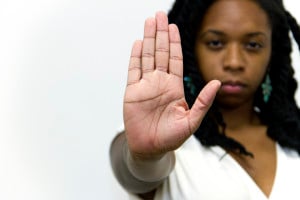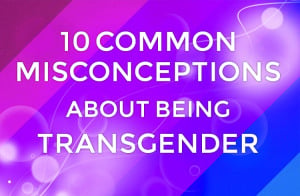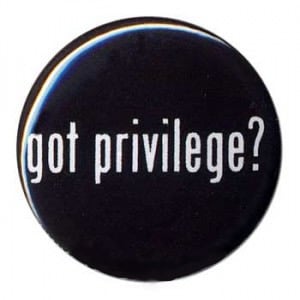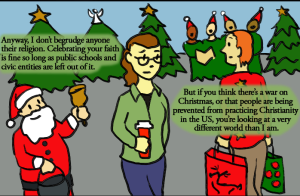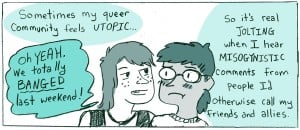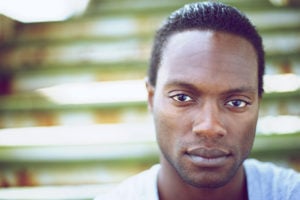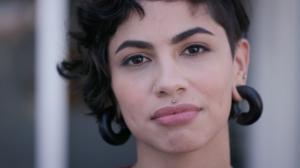
A person sitting on a sofa, their forehead leaning into their laced hands.
“I mean, I guess he kind of felt like an abusive partner. But I don’t think he, like, meant it that way.”
I was surprised to hear these words come out of my mouth a few months ago, as I was telling a friend about an ex-partner. Since when does intent matter? If he “kind of felt like an abusive partner,” doesn’t that mean that’s what he was?
I’m not sure where I am right now in the process of understanding that relationship, or deciding whether or not to label his actions abuse. But I hear statements like mine pretty often, and I’ve met lots of people struggling with the question of whether or not abuse can be “unintentional” – always with the implication that if it can, then what they experienced was abuse.
I understand the uncertainty. Abuse is a loaded word, and it might feel wrong to attach it to someone who we think genuinely wanted to be a good person and to do what’s best for us.
Many of us also tend to think of abusers as monsters, as extra-horrible people who bear little resemblance to “normal,” “good” people. That makes it very hard to label someone an abuser, even if what they did certainly feels abusive.
But remember: We are not judges or juries. We are individuals trying to make sense of our lives and the people in them. If you feel like you were abused, then maybe you were – although it’s always up to you how you label and describe your own experiences.
In short, I don’t think that “Can abuse be unintentional?” is a question that makes much sense to ask. Here’s why.
1. It Still Hurts
The reason we say that “intent isn’t fucking magic” – or, for those who prefer a bit less profanity, “intent versus impact” – is because being hurt hurts whether it was meant to or not.
Suppose someone genuinely believes that unless someone specifically says “no,” they’re consenting to sex. (This is really, really false.) They may sexually assault someone while genuinely believing that they have that person’s consent. But that doesn’t mean the person they assaulted feels any less violated. From their perspective, they didn’t consent. Because they didn’t. The assailant’s intentions don’t matter here.
Sexual assault is just one type of abuse. You might think that telling your partner what to wear and who to be friends with is an expression of your deep love for them, but they will likely experience this as control and coercion no matter how you meant it.
Of course, like all slogans, “intent isn’t fucking magic” doesn’t always capture the full depth of complicated interpersonal situations. I’m going to feel differently if someone steps on my foot by accident than if I know they did it on purpose, just to hurt me. I’m going to feel differently if my friend accidentally blabs my secret to someone she thought I had already told, than if she intentionally tells it to someone in order to spread gossip and humiliate me.
But my foot still hurts, and my secret is still out. That’s where intent doesn’t matter.
I’ve been in situations with abusive people before where I was slightly reassured by the fact that my partner probably genuinely wanted me to be happy and our relationship to be egalitarian, but they had fallen prey to the toxic messages we all internalize from our culture and had behaved in a controlling and guilt-tripping way as a result.
I would’ve probably felt worse if I had believed that they wanted to control and harm me. But I was still controlled and harmed. I still came out of those situations feeling like I had been—well—abused. Because I was.
2. No One ‘Intends’ to Abuse
Have you ever heard the saying “Everyone is the hero of their own story?”
It means that if you read the story from the perspective of Darth Vader or Voldemort or even Hitler, it’s not going to sound like a story about a villain. It’s going to sound like a story about someone bravely trying to save the galaxy or the wizarding world or Germany from those would would tear it apart.
That doesn’t mean that any of those people were justified in what they were doing, obviously. Abusers aren’t either. But if you ask an abuser why they do what they do, they won’t say, “In order to control and hurt people.”
They’ll say, “Because I can’t live without him so I need to make sure he won’t leave me.” They’ll say, “Because she’s disrespecting me and I won’t stand for that.” They’ll say, “Because I want my children to grow up successful and strong,” or “Because they made me so angry and I want them to feel the way I feel.” They might say, “Because I’m in love. How else do you expect me to act?”
Do any of these people “intend” to be abusive? That depends on what you mean by “intend.”
Do they intend for their targets to feel trapped and terrified? Maybe, maybe not. Do they intend to make their targets feel like nobody will ever treat them any different? I have no idea. But I’m guessing that very few abusers wake up in the morning thinking, “I’m going to abuse someone today.”
It doesn’t really make sense to ask if they intended to abuse or not, because we don’t know what’s in their heads – and they can’t exactly be trusted to tell us honestly. Most likely, abusers, like most people, think that the things they do are basically right and okay, or at least justified, or maybe the only option they have.
And abusers, also like most people, grow up in a society that teaches and encourages abusive behavior in many ways. When I was in high school, the Twilight series was very popular, and many girls I knew talked about how romantic and sexy Edward Cullen was. In fact, he’s a textbook abuser. So is his adult counterpart, Christian Grey.
That doesn’t mean everyone who gets butterflies in their stomach at the thought of a partner like that is going to experience that kind of treatment in real life – there’s a place for sexual and romantic fantasies that are just that.
But I’m not sure that everyone who reads stories like these (and there are so, so many of them) knows the difference. Because we don’t do a good job of teaching the difference in our society.
So, no. Many abusers probably don’t “intend” to be abusive. They probably intend to preserve their relationships, be partners in the only way they know how, and maintain their own flawed and convoluted sense of safety.
That doesn’t make them any less abusive. But it does make the question of intent less useful than you’d think.
3. If This Answer Matters, Abusers Can Let Themselves Off the Hook
Think about it this way: If we decide that it makes a difference whether an abuser meant to abuse or not, why wouldn’t all abusers just say they didn’t mean to?
Even if we acknowledge that “unintentional” abuse is still abuse, this still creates a sort of hierarchy of abuse in which one is presumably less bad than the other. Of course, that’s how it works in the legal system – accidentally hitting and killing someone with your car is seen differently than murdering someone.
But our social spaces are not courts of law, and we don’t have to decide if what someone did is bad enough that they should go to jail for years.
For us, it makes more sense to think not in terms of culpability, but in terms of harm. And if we decide that abusing someone “by accident” isn’t as bad as doing it “on purpose,” then the abusers in our social spaces just have to say, “But I didn’t mean to! I thought my behavior was okay because I’ve seen it on TV! I just love them so much and wanted to keep us together!” And then they’ll escape the worst of the social censure.
In fact, thanks to the messed-up way our society defines and responds to abuse, many abusers are already getting away with it.
For instance, think about how often we justify verbal abuse (especially from a man or masculine person) by pointing out how the other person made them really angry – as if anger and verbal abuse necessarily have to go together.
Sometimes people even justify physical violence this way. A recent report found that lawyers and judges dealing with domestic violence cases often use language that blames the survivor or excuses the abuser.
In a world where people minimize, excuse, and ignore abuse so often, it’s not surprising that abusers often get away with it. Let’s not give them even more tools to avoid accountability.
***
If you’re a survivor of abuse and it matters to you what your abuser intended, I hear you. Sometimes that’s part of the need for closure that most of us have when something terrible happens – the desire to understand how and why.
I wish that these answers were easier – were possible – to find. But they aren’t always.
As you work through your own experience, it might be more helpful to ask yourself questions like these:
- How do you feel about what happened? It’s okay if this is very different from how your abuser feels or how the people who know both of you feel.
- What do you need right now in terms of safety and support? Who do you feel safe with, and how can these people support you?
- What story will you tell yourself about your experience? Remember: That story is valid, and it’s not up to your abuser what story you tell.
If you’re on the outside as a bystander and you’re wondering if the abuser “really meant to” or not, I’d like to gently suggest that you move away from this question. Instead, ask yourself how you can best support the survivor, or survivors in general. Ask if the abuser is being held accountable or not – and if not, if there’s a way you could safely steer them in that direction.
And in general, I think we should all ask ourselves how we can better recognize abuse so that we can support ourselves and our loved ones. We should ask ourselves how we can make our spaces safer both for survivors of abuse, and for everyone else – by making them unsafe for abusers.
We should also ask ourselves the difficult questions about our own behavior. Remember, abusers are not villainous monsters, as easily identifiable as Darth Vader’s mask or Voldemort’s inhuman face. Anyone has the capacity to abuse. That doesn’t mean that everyone will, but it does mean that nobody gets to plaster the Good Person label onto themselves and never examine their own actions.
I wish that my ex-partner’s good intentions made all of the ways that relationship harmed me go away. I wish that my own good intentions guaranteed that I will never harm anyone that way, never have to think critically about my own behavior because I know that I meant well. But it doesn’t work that way.
But there’s also freedom in that. It means that you get to recognize your pain – and heal from it – regardless of the intentions of the person who caused it. It means that you don’t have to stay in a relationship that’s not working for you just because your partner intends for the relationship to be healthy.
That’s the case whether your partner is abusive or not. Your narrative doesn’t have to match up with anyone else’s. It’s yours to write.
[do_widget id=’text-101′]
Miri Mogilevsky is a Contributing Writer for Everyday Feminism and a recently graduated with a Masters in Social Work and is starting a career as a counselor in Columbus, Ohio. She loves reading, writing, and learning about psychology, social justice, and sexuality, and is working on her cat photography skills. Miri writes a blog called Brute Reason, rants on Tumblr, and occasionally even tweets @sondosia.
Search our 3000+ articles!
Read our articles about:
Our online racial justice training
Used by hundreds of universities, non-profits, and businesses.
Click to learn more





